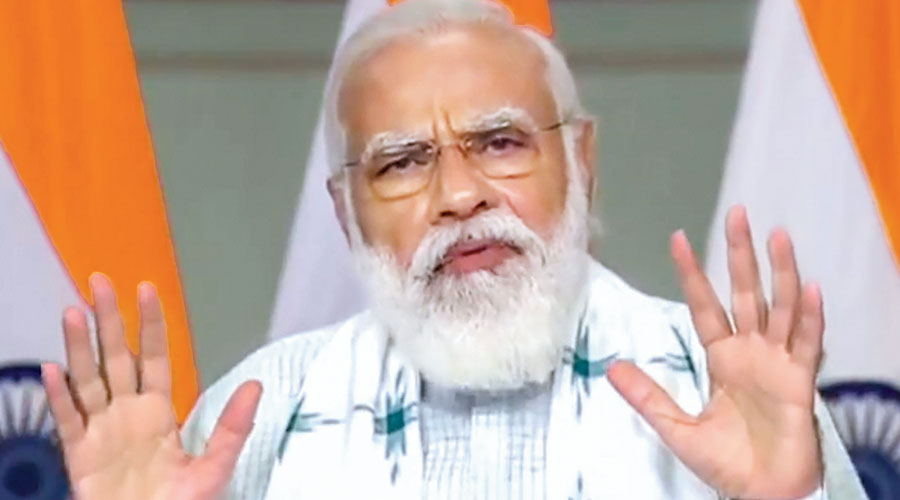The Narendra Modi government is reaching out individually to unorganised sector workers urging them to join its new contributory pension scheme against the backdrop of waning enthusiasm among intended beneficiaries.
The government is sending text messages to those eligible among the 27 crore unorganised sector workers registered under the e-SHRAM database, urging them to become part of the Pradhan Mantri Shram Yogi Maandhan (PM-SYM) Yojana.
As of March 31 this year, three years since its launch, only 46.56 lakh of the 38 crore intended beneficiaries in the unorganised sector have signed up for the PM-SYM.
Although the government has cited the pandemic for the slow uptake, experts have pointed to other issues such as the scheme having no provision for a nominee and the propensity of the poor not to go for regular payments over a prolonged period.
The Union labour ministry launched the PM-SMY in March 2019. That month, the last of the 2018-19 financial year, 27.72 lakh people registered for the scheme. Soon, interest began to taper off. The number of people who enrolled in the 2019-20 financial year was 15.9 lakh, which came down to 1.3 lakh in 2020-21 and 1.6 lakh in 2021-22.
In 2021-22, the government had a target to enrol one crore members.
The government has attributed the low enrolment to the impact of Covid on the lives of unorganised workers. “PM-SYM is a voluntary scheme. Moreover, the outbreak of the Covid-19 pandemic adversely affected lives of unorganised workers resulting in low fresh enrolments under PM-SYM scheme during this period,” minister of state for labour, Rameswar Teli, said in a written reply in the Rajya Sabha on March 31.
The government has started sending messages to the registered mobile phone numbers of the eligible unorganised workers listed on the e-SHRAM portal, a digital database the government launched in 2021 in the aftermath of many workers of this mammoth sector failing to secure pandemic-time benefits because of not being catalogued.
“To create the awareness, SMSs have been sent to eligible beneficiaries registered under e-SHRAM falling in the age group of 18-40 years to encourage them to also enroll under PM-SYM scheme,” Teli said in the written response.
The PM-SYM provides for a monthly pension of Rs 3,000 for subscribers once they turn 60. Workers between 18 and 40 years are eligible for the scheme, under which they have to contribute varying amounts depending on age while the government provides a matching amount.
For example, the contribution for an 18-year-old member enrolling under the scheme is Rs 55 a month while that of a 29-year-old worker is Rs 100 and that of a 40-year-old is Rs 200.
Under PM-SYM, only the person enrolling and the spouse are eligible to receive pension. In the event of both dying, the balance contribution of the worker will be deposited in the government’s pension fund as the scheme has no provision for a nominee, not even a minor offspring.
This is not the case under the Atal Pension Yojana, the other such scheme for the unorganised sector, and the Employees Provident Fund, both of which have the option of naming a nominee who would receive the balance contribution amount in case the beneficiary and the spouse die.
Trade union leaders The Telegraph spoke to said the PM-SYM notification defines “family” as the worker and the spouse, having no provision for their dependants.
Labour economist Prof. Amitabh Kundu said that given the prevalence of the joint family system in India, it is understandable that parents consider it their duty to leave something behind for their children or other family members.
“The Atal Pension Yojana (APY) in a way takes care of the family because of the entitlement to the corpus amount in addition to the monthly pension to the beneficiary and the spouse. Even if the member and the spouse die before turning 60, the nominee will get a substantial corpus amount. Given the prevalence of the joint family system, it is understandable that the parents consider it their duty to leave something for their children or others in the family. The facet of the PM Shram Yogi Maandhan Scheme wherein the pension is restricted to the lifetime of the registered couple does not match the family norms and culture in India,” Kundu said.
“Besides this, economically also the APY makes sense currently since the life expectancy of unorganised sector workers is around 65 years, entitling the couple to pension for about six to seven years. It is, therefore, financially profitable to go for
the APY. The Maandhan Scheme, on the other hand, is oriented to individual benefit. It stipulates that only the insured couple will get the entire benefit during their lifetime. However, if their life expectancy crosses 75 years, it would make economic sense to go for Shram Maandhan,” he added.
Sameet Panda, an activist and co-convenor the Odisha Khadya Adhikar Abhiyan, said rural people were not in the habit of contributing on a monthly basis for their social security.
“The mindset of the people is they will do hard labour and take their wage. In old age, they will get old-age pension as a government grant. Elderly people get Rs 200 a month as old-age pension under the National Social Assistance Programme,” Panda said, arguing that the comfort level among unorganised workers was higher with a dole than a contributory pension scheme.
He said many of those registered under the PM-SYM were struggling to make monthly payments.
“Poor people are not in the habit of making regular payments like EMIs. They do not keep adequate balance in their bank accounts, nor do they enable the auto-debit option. As a result, the banks penalise them (for failing to make the monthly contributions),” Panda said.











